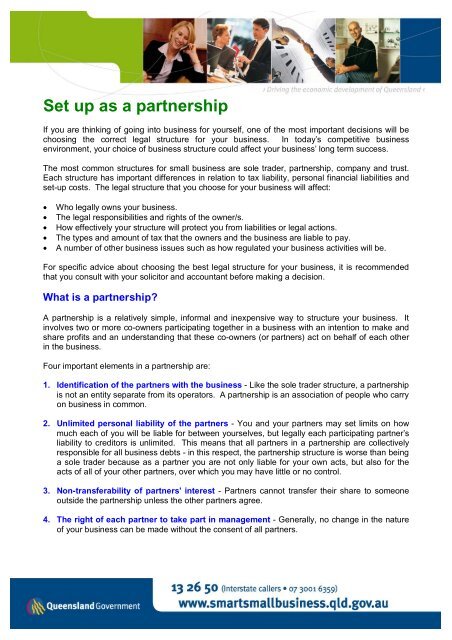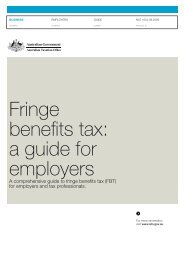Set up as a partnership.pdf
Set up as a partnership.pdf
Set up as a partnership.pdf
Create successful ePaper yourself
Turn your PDF publications into a flip-book with our unique Google optimized e-Paper software.
<strong>Set</strong> <strong>up</strong> <strong>as</strong> a <strong>partnership</strong><br />
If you are thinking of going into business for yourself, one of the most important decisions will be<br />
choosing the correct legal structure for your business. In today’s competitive business<br />
environment, your choice of business structure could affect your business’ long term success.<br />
The most common structures for small business are sole trader, <strong>partnership</strong>, company and trust.<br />
Each structure h<strong>as</strong> important differences in relation to tax liability, personal financial liabilities and<br />
set-<strong>up</strong> costs. The legal structure that you choose for your business will affect:<br />
• Who legally owns your business.<br />
• The legal responsibilities and rights of the owner/s.<br />
• How effectively your structure will protect you from liabilities or legal actions.<br />
• The types and amount of tax that the owners and the business are liable to pay.<br />
• A number of other business issues such <strong>as</strong> how regulated your business activities will be.<br />
For specific advice about choosing the best legal structure for your business, it is recommended<br />
that you consult with your solicitor and accountant before making a decision.<br />
What is a <strong>partnership</strong>?<br />
A <strong>partnership</strong> is a relatively simple, informal and inexpensive way to structure your business. It<br />
involves two or more co-owners participating together in a business with an intention to make and<br />
share profits and an understanding that these co-owners (or partners) act on behalf of each other<br />
in the business.<br />
Four important elements in a <strong>partnership</strong> are:<br />
1. Identification of the partners with the business - Like the sole trader structure, a <strong>partnership</strong><br />
is not an entity separate from its operators. A <strong>partnership</strong> is an <strong>as</strong>sociation of people who carry<br />
on business in common.<br />
2. Unlimited personal liability of the partners - You and your partners may set limits on how<br />
much each of you will be liable for between yourselves, but legally each participating partner’s<br />
liability to creditors is unlimited. This means that all partners in a <strong>partnership</strong> are collectively<br />
responsible for all business debts - in this respect, the <strong>partnership</strong> structure is worse than being<br />
a sole trader because <strong>as</strong> a partner you are not only liable for your own acts, but also for the<br />
acts of all of your other partners, over which you may have little or no control.<br />
3. Non-transferability of partners’ interest - Partners cannot transfer their share to someone<br />
outside the <strong>partnership</strong> unless the other partners agree.<br />
4. The right of each partner to take part in management - Generally, no change in the nature<br />
of your business can be made without the consent of all partners.
Is a <strong>partnership</strong> right for my business?<br />
A <strong>partnership</strong> may be the right business for you if:<br />
• You and your partner/s have confidence in each other’s abilities, compatibility, honesty and<br />
loyalty; and<br />
• If your business is re<strong>as</strong>onably ’low risk’; or<br />
• You are already a sole trader looking to share responsibility or grow your business.<br />
However, the detailed ownership rules, administrative structure, flexibility, limited liability and tax<br />
strategies that you will obtain through other structures such <strong>as</strong> a company or a trust may be more<br />
appropriate if your business is a ’high risk’ business or you have any doubts about your partners,<br />
despite the additional set <strong>up</strong> and operational costs and complexities of these other structures such<br />
<strong>as</strong> a company or a trust.<br />
What will be your liabilities <strong>as</strong> a partner?<br />
If you are considering entering into a <strong>partnership</strong>, you should be aware of the following liabilities:<br />
1. Joint and several liability - Each partner is capable of making all other partners liable by<br />
incurring debts in the name of the <strong>partnership</strong>. Partners are jointly and severally liable, which<br />
means that <strong>as</strong> well <strong>as</strong> having a shared liability for all of the debts of the <strong>partnership</strong>, they are<br />
also individually personally liable for all debts incurred by or in the name of the <strong>partnership</strong>.<br />
In this respect, the <strong>partnership</strong> structure is worse than being a sole trader because a partner is<br />
not only liable with their personal <strong>as</strong>sets for their own acts, but also for the acts of all of their<br />
partners, over which a partner may have little or no control.<br />
2. Contractual liabilities to third parties - The Partnership Act 1891 (Cwlth) places joint liability<br />
on all partners for the business’ debts and obligations incurred during their involvement in the<br />
<strong>partnership</strong>. In some c<strong>as</strong>es, partners can be liable for debts incurred without their knowledge<br />
or authority. This means that if your partner contracts with a s<strong>up</strong>plier, you may still be liable for<br />
the debt even if you didn’t know about it. You (<strong>as</strong> well <strong>as</strong> the partner who incurred the debt)<br />
can even be sued individually for all of the debt!<br />
3. Liability for wrongs to third parties - When partners retire they are still liable for debts and<br />
obligations incurred during their time in the <strong>partnership</strong> unless there is an alternative<br />
agreement between the other partners and the people to whom the debts are owed. New<br />
partners are not liable for debts or obligations incurred before their arrival into the <strong>partnership</strong><br />
unless they agree to be so.<br />
4. Liability to account - As a partner you are obliged to keep your partners properly informed.<br />
For example, if you are doing business outside of your <strong>partnership</strong> which is seen to be in<br />
competition, you are legally bound to inform your partners and may have to share any profits<br />
you make.
Do I need a <strong>partnership</strong> agreement?<br />
The Partnership Act 1891 (Cwlth) sets out various rules for the formation and operation of<br />
<strong>partnership</strong>s. However, many of these rules can be varied by a formal written <strong>partnership</strong><br />
agreement entered into by all the partners. Although it is not required by law, it is highly<br />
recommended that you enter into a written <strong>partnership</strong> agreement with your prospective partner(s).<br />
This agreement will be a useful point of reference in the event of disputes between the partners -<br />
which make it a valuable, and probably essential, document in any <strong>partnership</strong>.<br />
The <strong>partnership</strong> agreement will also <strong>as</strong>sist to ensure that all partners have a clear understanding of<br />
their rights, responsibilities and obligations <strong>as</strong> a partner. The <strong>partnership</strong> agreement should be<br />
reviewed regularly.<br />
How do I draw <strong>up</strong> a <strong>partnership</strong> agreement?<br />
The following will provide you with a general idea of what to include in a <strong>partnership</strong> agreement.<br />
There will be other issues that you should include in your <strong>partnership</strong> agreement to cater for your<br />
individual business needs. Your solicitor can <strong>as</strong>sist you in tailoring the agreement to meet your<br />
requirements.<br />
Legal Financial Personal<br />
The name of the <strong>partnership</strong><br />
and its main purpose.<br />
How long the <strong>partnership</strong> will<br />
be in existence and when a<br />
review will be undertaken.<br />
How new partners will be<br />
admitted and how existing<br />
partners will resign, retire or be<br />
dismissed.<br />
The ground rules covering<br />
death and business closure.<br />
Further information<br />
The capital and expertise each<br />
partner will invest in the<br />
business and whether or not<br />
there will be a designated<br />
interest rate payable on those<br />
funds.<br />
Details of profit sharing and how<br />
these profits can be drawn from<br />
the business.<br />
Consideration of the accounting<br />
functions, bank accounts and<br />
records.<br />
Names and addresses of<br />
the partners.<br />
Each partner’s stake in the<br />
business.<br />
Details of working partner<br />
remuneration (salaries<br />
and/or share in profit) and<br />
fringe benefits.<br />
For specific legal and taxation advice, consult with your solicitor and/or accountant. They are able<br />
to keep you <strong>up</strong> to date on changes in the law - which may affect your choice of legal structure for<br />
your business.<br />
The following fact sheets provide further information on these issues:<br />
• Business name registration<br />
• Legal <strong>as</strong>pects of succession planning<br />
• Tax implications of a <strong>partnership</strong>








